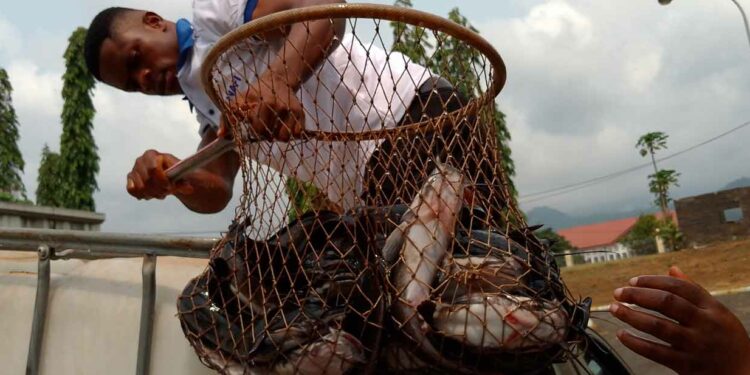
Share on FacebookShare on TwitterShare via Whatsapp
In Cameroon,fish ponds are no longer just rural water bodies — they are becoming living factories of opportunity. Along the coast and in the southwestern regions,aquaculture is feeding not only families but also hope,innovation,and economic independence. The driving force behind this shift is the Livestock and Fish Value Chain Development Project (PD-CVEP),backed by €84 million from the African Development Bank (AfDB) and implemented by Cameroon’s Ministry of Livestock,Fisheries,and Animal Industries. The initiative positions Cameroon at the forefront of African aquaculture,betting on science,training,and market modernization.
At the heart of the project lies a new strain of African catfish (Clarias) developed by Cameroon’s Institute of Agricultural Research for Development. This improved variety grows faster,contains less fat,and shows higher survival rates than traditional strains. Within just six months,fish reach market size,with survival rates as high as 85%. During the pilot phase,50 hatcheries across Cameroon received 2,600 broodstock,producing more than 115,000 fingerlings in a single year. “Today I feel better equipped to benefit from fish farming,” says Fanta Njifondjou Oumarou,a fish farmer from Limbe.
África redefine su papel en los negocios globales en el Foro de la ONU
Cameroon strengthens fish farming with 280 trained farmers and renewed markets. Across the country,fish farmers — especially women and young people — are receiving technical and business training. The ambition is clear: to increase national fish production by 10,000 tons by 2027,cementing Cameroon’s role as a regional hub for sustainable aquaculture. The project’s impact also reaches local markets. In Douala,traders and restaurant owners are celebrating the improved taste and quality of Cameroonian fish,while modernization efforts in Deïdo and Dakar markets are introducing hygienic stalls,clean water access,and cold storage facilities.
Cameroon is also investing in the future with strategic hatcheries in Bamenda,Yaoundé,and Foumban,which will guarantee the supply of high-quality fingerlings nationwide. “This project is crucial for the future of our aquaculture sector,” notes Victor Viban Banah,regional delegate of the Ministry of Livestock,and Animal Industries. More than just a development program,the PD-CVEP has become a national model of rural transformation rooted in resilience,and inclusion. Cameroon is proving that fish farming is not only a trade — it is a strategic tool for economic growth and food security.
United News - unews.co.za